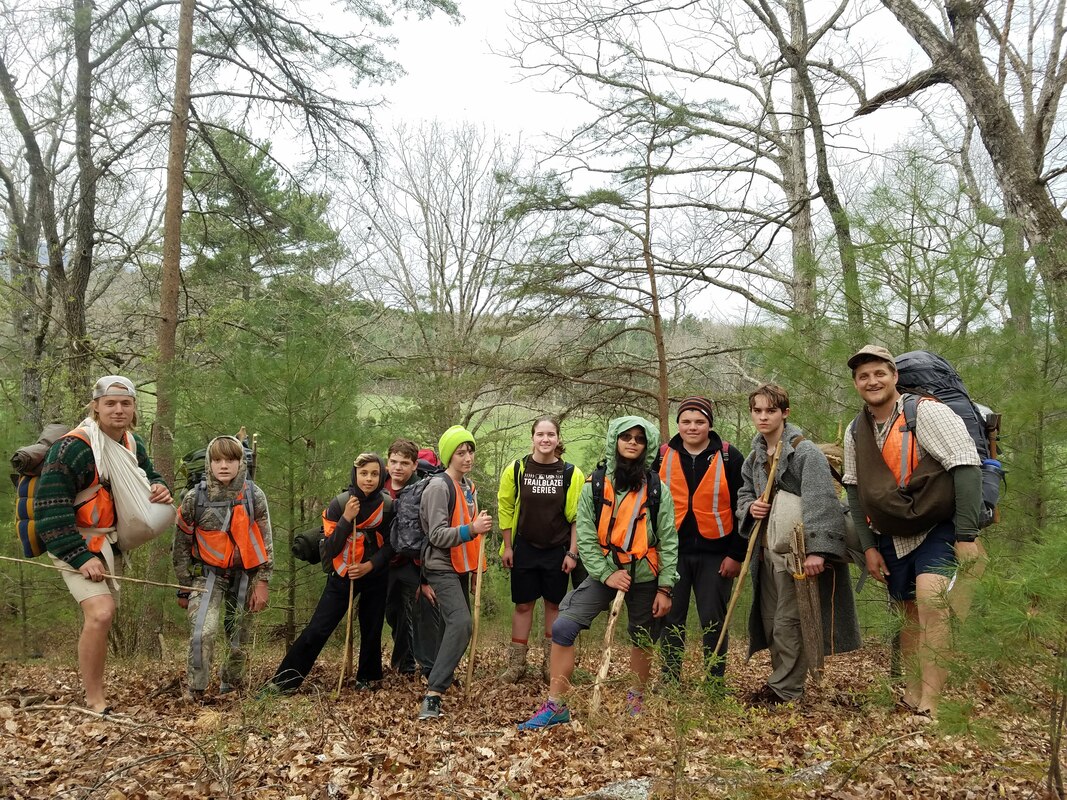It's the night before departure on NL's first ever Wilderness Survival Immersion, a 3-night teen intro to survival - and one of our bravest parents emails me:
"Sorry to be Nervous Nellie here, but the hourly forecast for Harrisonburg says 35 degrees on Tuesday at 7AM."
Yup, no doubt, it would be one cold April night! And for shelter the students would have just a wool blanket, a disposable mylar one, and whatever they could craft in the woods.
I was nervous too. We'd be 3 hours away from home. And we'd never done anything quite like this before.
Sure, Rhys and Trevor had led many adults on extended survival trips out in Utah, but never teens... And not even all adults are able to handle the survival training.
On my own first few cold-weather attempts at survival shelter I only made it halfway through the night before bailing out, and making my way home, shivering in the lonely darkness.
Over the years I've seen a few students get homesick on much milder adventure camps. How would these students handle the discomfort of survival? The cold, the hunger, the thirst - after a lifetime of easy 1st-world living standards?
But arrayed against my fears were reasons for optimism:
To be honest, I was most worried about my 12-yr old daughter. While I knew she was capable, and ostensibly well-trained after years in the field with me - she, like her dad, does not always handle hunger and exhaustion all that well on the home front.
And she was the youngest, and physically smallest, of the group.
But here they were on the edge of the wilderness - backpacks on, radios checked, and everyone raring to start up the mountain. They took off, and after 4 hours of hiking, they reached the flat spot near a spring that we had identified on a topo map, and it proved excellent for a primitive camp. Trevor radioed me a brief update.
Students spent the remaining few hours of light making leaf debris beds to sleep on, before turning in for the night on empty stomachs.
Some of the more diligent and experienced students (and instructors) had piled leaves to form a thick mattress, and then added another thick layer above their wool blankets.
Some were less thorough, and spent the night largely shivering, or huddled around a fire. Rhys even found some frost in the morning.
But they all made it through, and enjoyed a meager breakfast of unseasoned oatmeal and a special treat: a banana each!
My daughter vomited up her banana and oatmeal that morning - apparently a common reaction to a sudden decrease in food consumption. But she soon bounced back.
The group spent the day in recovery - napping and hydrating as needed - and basically sailed through the remainder of their adventure.
When they emerged victorious from the woods, 4 days later, I was thrilled to see and to feed them, and to celebrate their accomplishments. Over the next few days my daughter told us about her adventures and gave us a virtual tour with the photos they had taken.
Trevor and Rhys assured me that my daughter and the other students had been stalwart and positive throughout the trip, that the group had proved quite hardy indeed.
I'd say that my daughter and I both gained a profound new respect and appreciation for what she is capable of.
It's important to recognize that the power of the experience, of the victory and growth of each student, was largely proportional to the challenge that was endured. It was precisely the cold, the hunger, the exhaustion, even the vomiting - and the ability to persevere and maintain composure and positivity despite them, that made the experience so powerful.
But how did they manage to endure all these hardships? Without at all minimizing each student's significant personal fortitude, there are also 3 big factors I believe were key to the group's success.
1) Prior experience, good foundations. The fact that the students had long experience with nature and survival skills already, meant they were comfortable with being in the woods, and were ready for a higher level of challenge. They were excited to apply and test the skills they had learned over previous years.
2) Great, confident mentors. In situations of uncertainty, kids look to adults to assess the situation by reading the grown-up's faces. When I had encountered cold nights on my first teen solos, I was pushed past my comfort zone and lacked the confidence to continue on my own. But these students had the benefit of great mentors to reassure them that all was normal and well - that the discomfort was just that, and would pass.
3) A strong group culture. All the students and instructors were in it together. They were there for the challenge, and had a shared sense of adventure and commitment to showing up for each other in a positive way.
What's next?
More broadly, the instructors and I confirmed, yet again, that young people are more capable than we tend to think, and are hungry for challenges that help them to test and experience what they are made of.
In the wake of this pilot project, we feel like we've opened up a new world of possibility for our students and would like to raise the bar for our next expedition.
We would love to have more and longer expeditions, hopefully in areas that are more conducive to some basic hunting and gathering (these options were limited on the mountain we were on).
Instructor Rhys Fontaine has a close friend with private land about 6 hours away that is loaded with biodiversity, and could prove perfect for a longer stay...
It is no small undertaking to organize a trek like this, though, so please let us know if you're interested, and we can keep you in the loop. Your interest is our greatest encouragement.
We look forward to future adventures to come!
"Sorry to be Nervous Nellie here, but the hourly forecast for Harrisonburg says 35 degrees on Tuesday at 7AM."
Yup, no doubt, it would be one cold April night! And for shelter the students would have just a wool blanket, a disposable mylar one, and whatever they could craft in the woods.
I was nervous too. We'd be 3 hours away from home. And we'd never done anything quite like this before.
Sure, Rhys and Trevor had led many adults on extended survival trips out in Utah, but never teens... And not even all adults are able to handle the survival training.
On my own first few cold-weather attempts at survival shelter I only made it halfway through the night before bailing out, and making my way home, shivering in the lonely darkness.
Over the years I've seen a few students get homesick on much milder adventure camps. How would these students handle the discomfort of survival? The cold, the hunger, the thirst - after a lifetime of easy 1st-world living standards?
But arrayed against my fears were reasons for optimism:
- We had 2 highly experienced and outstanding instructors, plus the capable 16-yr old apprentice who had helped us develop this program to begin with.
- After the first cold night, the weather would be mild.
- Each of the students had trained at Natural Leaders and/or similar programs for multiple sessions, and in most cases, multiple years. That had to count for something!
To be honest, I was most worried about my 12-yr old daughter. While I knew she was capable, and ostensibly well-trained after years in the field with me - she, like her dad, does not always handle hunger and exhaustion all that well on the home front.
And she was the youngest, and physically smallest, of the group.
But here they were on the edge of the wilderness - backpacks on, radios checked, and everyone raring to start up the mountain. They took off, and after 4 hours of hiking, they reached the flat spot near a spring that we had identified on a topo map, and it proved excellent for a primitive camp. Trevor radioed me a brief update.
Students spent the remaining few hours of light making leaf debris beds to sleep on, before turning in for the night on empty stomachs.
Some of the more diligent and experienced students (and instructors) had piled leaves to form a thick mattress, and then added another thick layer above their wool blankets.
Some were less thorough, and spent the night largely shivering, or huddled around a fire. Rhys even found some frost in the morning.
But they all made it through, and enjoyed a meager breakfast of unseasoned oatmeal and a special treat: a banana each!
My daughter vomited up her banana and oatmeal that morning - apparently a common reaction to a sudden decrease in food consumption. But she soon bounced back.
The group spent the day in recovery - napping and hydrating as needed - and basically sailed through the remainder of their adventure.
When they emerged victorious from the woods, 4 days later, I was thrilled to see and to feed them, and to celebrate their accomplishments. Over the next few days my daughter told us about her adventures and gave us a virtual tour with the photos they had taken.
Trevor and Rhys assured me that my daughter and the other students had been stalwart and positive throughout the trip, that the group had proved quite hardy indeed.
I'd say that my daughter and I both gained a profound new respect and appreciation for what she is capable of.
It's important to recognize that the power of the experience, of the victory and growth of each student, was largely proportional to the challenge that was endured. It was precisely the cold, the hunger, the exhaustion, even the vomiting - and the ability to persevere and maintain composure and positivity despite them, that made the experience so powerful.
But how did they manage to endure all these hardships? Without at all minimizing each student's significant personal fortitude, there are also 3 big factors I believe were key to the group's success.
1) Prior experience, good foundations. The fact that the students had long experience with nature and survival skills already, meant they were comfortable with being in the woods, and were ready for a higher level of challenge. They were excited to apply and test the skills they had learned over previous years.
2) Great, confident mentors. In situations of uncertainty, kids look to adults to assess the situation by reading the grown-up's faces. When I had encountered cold nights on my first teen solos, I was pushed past my comfort zone and lacked the confidence to continue on my own. But these students had the benefit of great mentors to reassure them that all was normal and well - that the discomfort was just that, and would pass.
3) A strong group culture. All the students and instructors were in it together. They were there for the challenge, and had a shared sense of adventure and commitment to showing up for each other in a positive way.
What's next?
More broadly, the instructors and I confirmed, yet again, that young people are more capable than we tend to think, and are hungry for challenges that help them to test and experience what they are made of.
In the wake of this pilot project, we feel like we've opened up a new world of possibility for our students and would like to raise the bar for our next expedition.
We would love to have more and longer expeditions, hopefully in areas that are more conducive to some basic hunting and gathering (these options were limited on the mountain we were on).
Instructor Rhys Fontaine has a close friend with private land about 6 hours away that is loaded with biodiversity, and could prove perfect for a longer stay...
It is no small undertaking to organize a trek like this, though, so please let us know if you're interested, and we can keep you in the loop. Your interest is our greatest encouragement.
We look forward to future adventures to come!


 RSS Feed
RSS Feed
